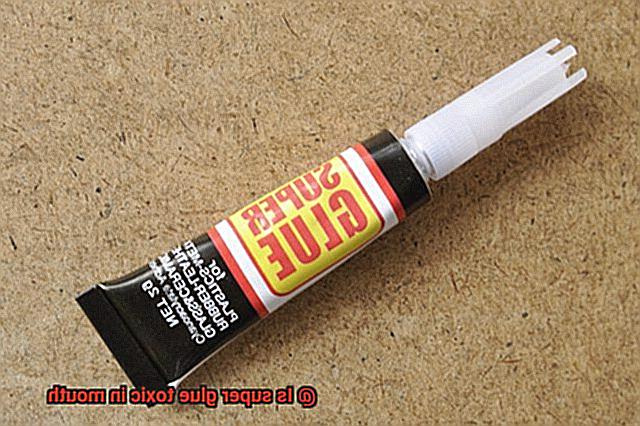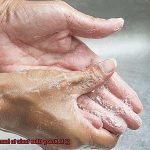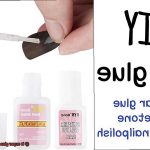Today, we’re tackling a question that might seem a bit bizarre at first glance – is super glue toxic when it finds its way into your mouth? Now, you might be thinking, “Who on earth would put super glue in their mouth?”
Whether you’re a DIY enthusiast with butterfingers or have little explorers running around, it’s important to know the potential risks associated with accidentally ingesting super glue.
So grab a seat and get ready to uncover the truth about this sticky situation.
Potential Hazards of Super Glue in the Mouth
Contents
- 1 Potential Hazards of Super Glue in the Mouth
- 2 Chemical Composition of Cyanoacrylate Adhesives
- 3 How Super Glue Reacts with Moisture
- 4 Adverse Effects of Ingesting Super Glue
- 5 Toxic Fumes Released by Super Glue
- 6 Symptoms of Inhaling Toxic Fumes
- 7 Prevention Strategies for Accidental Ingestion or Application in the Mouth
- 8 Seeking Immediate Medical Attention
- 8.1 Chemical Burns and Tissue Damage:
- 8.2 Obstruction of Airway and Digestive Tract:
- 8.3 Stay Calm and Call for Help:
- 8.4 Rinse with Water or Milk (if conscious):
- 8.5 Avoid Scraping or Removing Glue:
- 8.6 Assessment by Healthcare Professionals:
- 8.7 Surgical Intervention (in severe cases):
- 8.8 Prevention is Key:
- 9 Conclusion
Super glue, also known as cyanoacrylate adhesive, is a powerful bonding agent that has become a household staple for fixing broken items. However, when it comes to your mouth, this seemingly harmless adhesive can pose serious health risks. In this blog post, we will explore the potential hazards of using super glue in the mouth and why it should never be taken lightly.
Toxicity and Chemical Burns:
One of the main hazards of super glue in the mouth is its toxic nature. The chemicals found in super glue are not meant to be ingested or come into contact with the sensitive tissues of the oral cavity. When exposed to saliva and oral tissues, these chemicals can cause irritation, inflammation, and even chemical burns. Imagine the discomfort and pain that can result from such exposure.
Choking and Obstruction:
Accidental swallowing of super glue or its inhalation can lead to choking or obstruction. Super glue in the throat can impede breathing and potentially block the airways, risking an individual’s life. This danger is particularly concerning for young children who may mistake super glue for food or candy.
Damage to Dental Work:
Super glue can wreak havoc on dental work or orthodontic appliances like braces or retainers if they come into contact with it. The adhesive properties of super glue can bond these devices together, making their removal difficult and leading to costly repairs or replacements.
Allergic Reactions:
In some cases, individuals may develop an allergic reaction when super glue comes into contact with their mouth. Symptoms may include swelling, redness, itching, and difficulty breathing. Seeking immediate medical attention is crucial if any signs of an allergic reaction occur.
Gastrointestinal Issues:
Accidental ingestion of super glue can lead to gastrointestinal problems such as nausea, vomiting, abdominal pain, and diarrhea. These symptoms should never be ignored as they can indicate serious internal damage.
Chemical Composition of Cyanoacrylate Adhesives
The answer lies in the fascinating chemical composition of cyanoacrylate adhesives, commonly known as super glue.
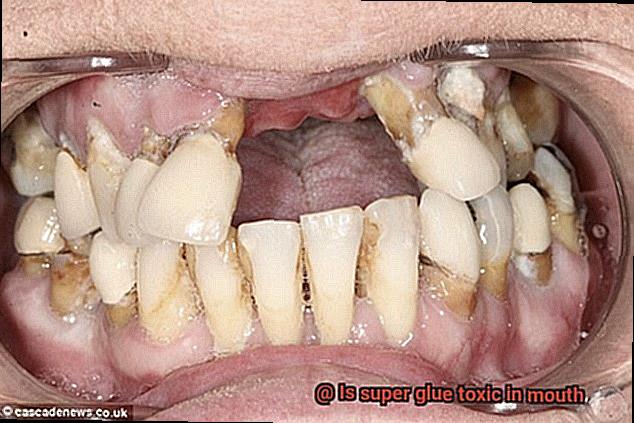
At the core of these adhesives is the cyanoacrylate monomer, a liquid that transforms into a solid when it encounters moisture. This monomer consists of a cyano group (C≡N) and an alkyl group (R). But here’s the intriguing part – the alkyl group can vary in size and structure, giving different super glues their unique qualities.
The alkyl group determines important characteristics such as viscosity (how thick or runny the adhesive is), curing time (how quickly it sets), and strength (how effectively it bonds surfaces together). So depending on the specific formulation of the adhesive, you might find super glue that’s runnier or thicker, sets in seconds or minutes, and bonds with varying degrees of strength.
But wait, there’s more. Super glue isn’t solely composed of cyanoacrylate monomers. Other ingredients are added to enhance specific aspects of the adhesive. Stabilizers, for instance, extend its shelf life, while thickeners control its viscosity.
However, it’s crucial to remember that cyanoacrylate adhesives like super glue were never intended for oral use. While discussing their chemical composition, it’s important to acknowledge that they haven’t undergone thorough testing for oral safety. Ingesting super glue can lead to serious health concerns because it rapidly solidifies upon contact with moisture in your mouth and digestive system.
How Super Glue Reacts with Moisture
The secret lies in the interaction between super glue and moisture. In this article, we will explore the science behind this process, understanding how moisture triggers polymerization and discussing essential considerations when working with super glue.
The Crucial Role of Moisture in Bonding:
Moisture plays a vital role in the bonding process of super glue. When exposed to moisture, a chemical reaction called polymerization occurs. This reaction transforms the liquid glue into a solid state, creating a powerful bond between surfaces. Without moisture, the glue cannot effectively harden or create a strong bond.
Achieving the Perfect Balance of Moisture:
While moisture is necessary for bonding, excessive moisture can dilute the glue and hinder the bonding process. It is crucial to strike the right balance of moisture for optimal bonding. Too much moisture can result in a weak bond that may break easily.
Lightning-Fast Reaction Time:
One of the remarkable properties of super glue is its lightning-fast reaction time with moisture. As soon as it comes into contact with water or any other liquid, it initiates the polymerization process and begins to set instantly. This rapid reaction time makes super glue an ideal adhesive for quick and efficient bonding.
Drying Time and Environmental Factors:
The presence of moisture can affect the drying time of super glue. In humid environments or when exposed to high levels of moisture, the glue may take longer to dry and harden completely. It is important to consider these environmental factors when using super glue to ensure optimal results.
Safety Precautions:
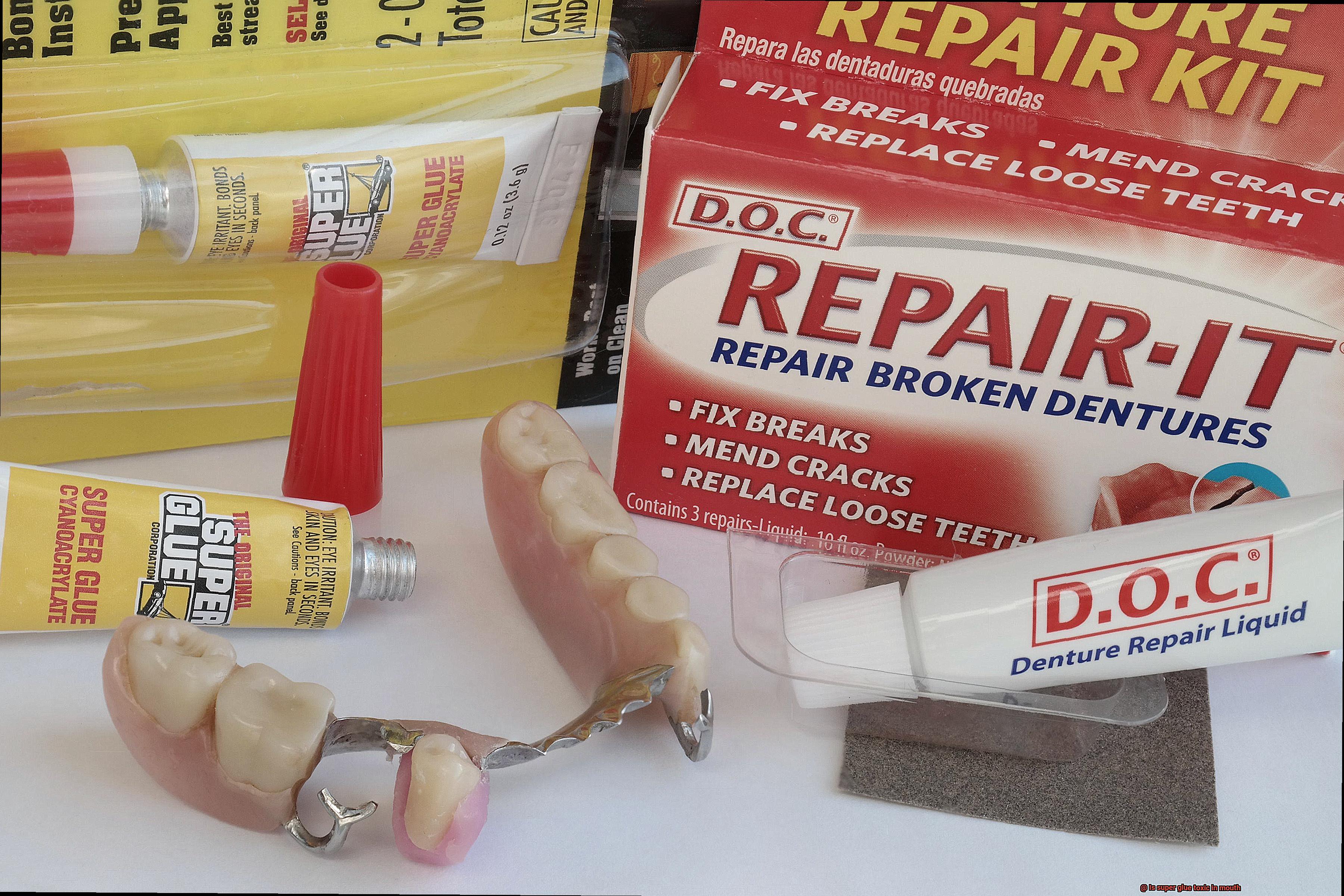
Although super glue is a powerful adhesive, it requires careful handling. The fumes emitted by super glue can be irritating to the eyes, nose, and throat, so it is essential to use it in well-ventilated areas. Additionally, extra caution should be exercised when using super glue around moist areas like the mouth to avoid accidental ingestion or contact with lips, tongue, or gums.
Accidental Ingestion and Proper Removal:
Ingesting super glue can be harmful and toxic if swallowed in large amounts. If accidental contact with the mouth or lips occurs, immediate rinsing with warm water is recommended. If the glue has already hardened, seeking medical advice for proper removal is advised.
Adverse Effects of Ingesting Super Glue
We all know the wonders of super glue when it comes to bonding materials together. However, did you know that this powerful adhesive can turn into a real sticky situation if ingested? Today, we’ll explore the adverse effects of ingesting super glue and discuss crucial safety tips to prevent any accidental glue-related mishaps.
The Dangers of Ingesting Super Glue:
Blockages in the Digestive System:
One of the most immediate concerns is the potential for blockages in the digestive system. When super glue comes into contact with saliva, it rapidly hardens, forming a solid mass that can obstruct the throat or esophagus. Imagine trying to swallow a rock. This can lead to difficulty swallowing or even choking, posing serious risks to one’s health.
Chemical Burns:
Super glue contains potent chemicals that can irritate and damage tissues in the mouth and gastrointestinal tract. The result? Pain, redness, swelling, and potentially even ulcers or sores. It’s like having a fiery dragon breathe its scorching breath inside your body. These burns can cause immense discomfort and may require medical intervention for proper healing.
Toxic Properties:
While super glue itself is not highly toxic, it has the potential to release harmful fumes when it reacts with moisture in the body. These fumes can irritate the delicate respiratory system, causing symptoms such as coughing, wheezing, and shortness of breath. It’s as if tiny glue monsters have invaded your lungs, wreaking havoc on your ability to breathe freely.
Systemic Effects:
Ingesting large quantities or regularly consuming super glue can have systemic effects on the body. The powerful chemicals in the adhesive can enter the bloodstream and potentially cause damage to vital organs like the liver and kidneys. It’s as if a sticky octopus has latched onto your organs, slowly strangling them and compromising their ability to function properly. This sticky situation can quickly escalate into a serious health problem.
Treatment and Prevention:
Seek Medical Attention:
If someone has ingested super glue, it is crucial to seek immediate medical attention. Medical professionals may employ techniques like endoscopy or surgery to remove any blockages. They may also provide supportive care, such as pain relief medications and topical treatments for burns. Remember, swift action can make all the difference in minimizing the potential harm caused by ingesting super glue.
Safety First:
Prevention is the key to avoiding the adverse effects of ingesting super glue. Keep super glue and other potentially harmful substances out of the reach of children and individuals with cognitive impairments. Store them in secure places, far away from curious hands and mouths. Additionally, exercise caution when handling and storing super glue to minimize the risk of accidental ingestion. It’s like creating a fortress around your glue stash, ensuring its safety and protecting those around you.
Super glue may be a magician when it comes to bonding materials together, but it can quickly turn into a villain if ingested. The adverse effects range from blockages in the digestive system to chemical burns and even toxic fumes invading your respiratory system. Remember, prevention is better than a frantic trip to the emergency room. Handle super glue with care, keep it out of reach from curious kids and pets, and always prioritize safety above all else.
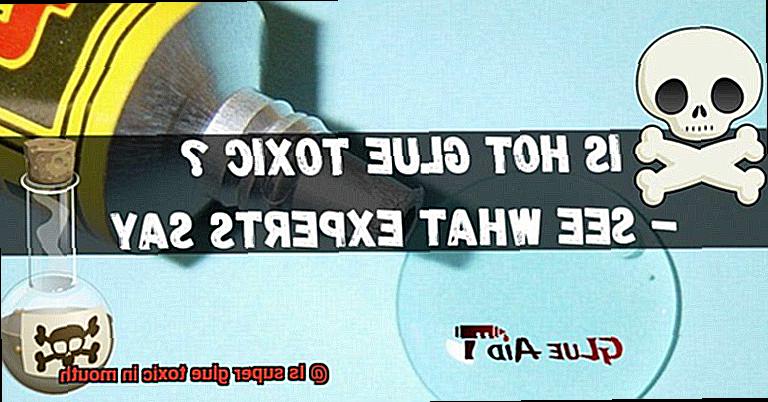
Toxic Fumes Released by Super Glue
Imagine the scene: you’re engrossed in a creative project, meticulously joining materials with super glue. Lost in the moment, it’s easy to overlook the potential health risks posed by the fumes released from this seemingly harmless adhesive.
In this enlightening article, we will delve into the dangers of inhaling or ingesting toxic fumes from super glue and explore essential safety measures for your protection.
The Toxic Fumes: A Silent Threat
When super glue dries, it emits fumes containing a chemical known as cyanoacrylate. These fumes, innocently invisible, can prove perilous when inhaled or ingested. Picture yourself inadvertently breathing them in – brace yourself for an onslaught of symptoms: coughing, wheezing, and an unwelcome shortness of breath. Hardly ideal while pursuing your creative masterpiece.
Swallowing Super Glue: The Unpleasant Consequence
Now let’s address the accidental ingestion of super glue. Trust me, it’s an experience you’d rather avoid. Consuming this adhesive can cause gastrointestinal irritation and potentially lead to blockages within your digestive system. Just imagine the discomfort – abdominal pain, nausea, vomiting, and swallowing difficulties. Definitely not worth the risk.
Safe Handling Tips: Shielding Yourself from Harm
To minimize exposure to these pernicious fumes, it is crucial to adhere to safety guidelines. First and foremost, always use super glue in a well-ventilated area. This ensures that the fumes disperse rapidly, reducing their concentration in the air. No more inhaling those pesky fumes.
Secondly, resist any temptation to put super glue in your mouth or any other body part. Remember, this adhesive is designed for material bonding and not as a curious experiment for your taste buds.
Lastly, accidents happen. If, by chance, you ingest or inhale super glue, remain calm and seek immediate medical attention. Healthcare professionals possess the expertise to assess the situation and provide suitable treatment based on the severity of your exposure.
Symptoms of Inhaling Toxic Fumes
It’s like having a trusty superhero for fixing things in a jiffy. However, it’s essential to be aware that this ally can pose serious risks to our health. In this article, we’ll explore the symptoms of inhaling toxic fumes from super glue and the importance of recognizing these potential dangers.
Respiratory Distress:
Imagine this scenario – you’re mending your beloved broken mug, and suddenly a tickle crawls into your throat. Before you know it, you’re coughing and struggling for a deep breath. Those pesky fumes from super glue can irritate your airways, leading to respiratory distress. So remember, work in a well-ventilated area to protect yourself.
Headaches and Dizziness:
Have you ever experienced an unexpected headache or felt dizzy while working on a craft project with super glue? It’s not mere coincidence; it’s the fumes at play. These chemicals interfere with your brain’s normal functioning, leaving you feeling lightheaded and reaching for aspirin.
Eye and Nasal Irritation:
As you happily glue away, suddenly your eyes begin uncontrollably watering. Yes, that’s another “gift” from those toxic fumes. Your eyes and nose may feel itchy, red, or even become runny or stuffy. It’s like experiencing an unwanted allergy attack courtesy of those sneaky chemicals.
Nausea and Vomiting:
Imagine the worst-case scenario – accidentally inhaling a significant amount of super glue fumes (we’ve all been there). Suddenly, your stomach churns, and before you know it, you’re hunched over the toilet bowl. Inhaling toxic fumes can wreak havoc on your gastrointestinal system, leading to nausea and vomiting. Not a pretty sight, right?
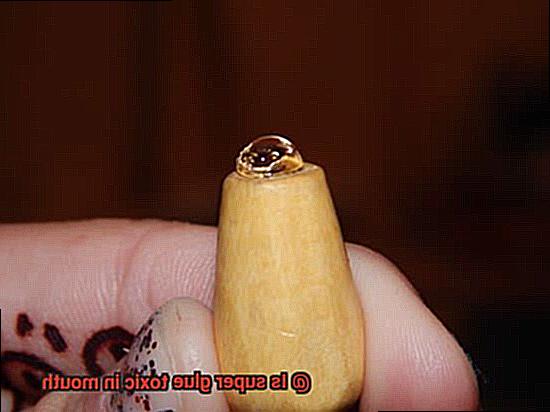
Skin Irritation:
Let’s not forget about our poor skin. Direct contact with super glue or its fumes can cause irritation, resulting in redness, itching, or even a rash. Remember to wear gloves and take necessary precautions to avoid any unwanted skin reactions.
Fatigue and Weakness:
You’ve spent hours on that intricate craft project, and suddenly you feel as if you’ve just run a marathon. Prolonged exposure to toxic fumes can drain your energy levels, leaving you fatigued and weak. It’s as if your body is shouting, “Hey, I need a break from these fumes.”
Conclusion:
To all my fellow crafters and DIY enthusiasts, while super glue is undoubtedly a lifesaver in many situations, it’s crucial to recognize the potential risks associated with inhaling its toxic fumes. Always work in a well-ventilated area, wear protective gear like gloves, and if you experience any of these symptoms after inhaling super glue fumes, don’t hesitate to seek immediate medical attention. Remember, safety should always come first.
Prevention Strategies for Accidental Ingestion or Application in the Mouth
Super glue is a powerful adhesive that quickly bonds surfaces together. However, it can be hazardous if accidentally ingested or applied to the mouth. In this blog post, we will discuss effective prevention strategies to ensure the safe handling and storage of super glue, particularly in households with children. By following these guidelines, you can reduce the risk of accidental ingestion or application and protect your family’s well-being.
Store Super Glue Safely:
- Keep super glue out of reach of children and pets by storing it in a secure place.
- Lock cabinets or place it on high shelves to prevent easy access.
- Always tightly seal the container when not in use.
Read and Follow Instructions:
- Carefully read and understand the instructions provided by the manufacturer before using super glue.
- Follow any safety precautions mentioned on the packaging, such as wearing protective gloves and eyewear.
Wear Protective Gear:
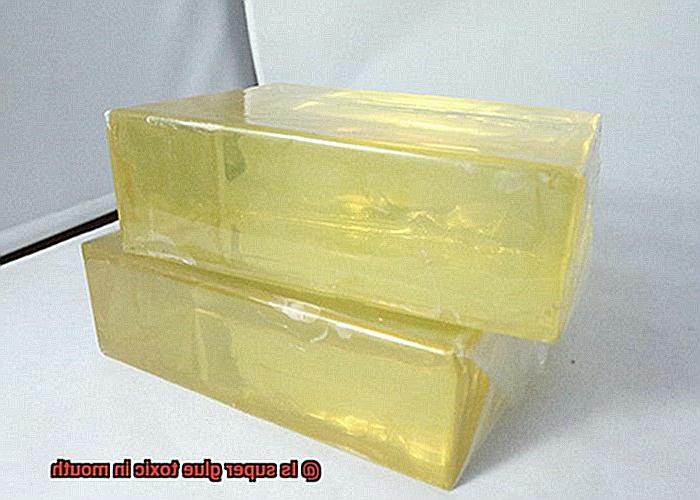
- When working with super glue, wear protective gloves to avoid contact with your skin.
- Use protective eyewear to shield your eyes from splashes or drips.
Supervise Children:
- In households with young children, provide constant supervision.
- Educate children about the dangers of super glue and teach them not to put objects in their mouths without adult supervision.
Seek Immediate Medical Attention:
- If accidental ingestion or application occurs, seek immediate medical attention.
- Do not induce vomiting unless instructed by a healthcare professional.
Rinse Mouth with Water:
- While waiting for medical help, rinse the mouth with water to dilute any residue and reduce potential chemical burns.
- Avoid forcefully removing hardened glue from the mouth, as this can cause further damage.
Seeking Immediate Medical Attention
When it comes to handling super glue, seeking immediate medical attention is absolutely vital in cases of accidental ingestion or contact with the mouth. Super glue, scientifically known as cyanoacrylate adhesive, possesses an incredible bonding power that can pose serious health risks if mishandled. This blog post aims to emphasize the importance of seeking prompt medical attention and offers valuable tips on what to do in the event of a super glue accident.
The Dangers of Super Glue Ingestion:
Chemical Burns and Tissue Damage:
Super glue’s powerful composition can lead to chemical burns upon contact with the delicate tissues in the mouth. These burns cause excruciating pain, severe swelling, and potential long-term damage. Furthermore, if super glue is accidentally ingested, it hardens rapidly and adheres to the internal surfaces of the mouth, resulting in tissue damage.
Obstruction of Airway and Digestive Tract:
Accidental ingestion of super glue can have life-threatening consequences as it can obstruct both the airway and digestive tract. Due to its ability to harden in moments when exposed to moisture, super glue can swiftly block or constrict these vital passages.
Immediate Actions to Take:
Stay Calm and Call for Help:
In any super glue accident involving ingestion or contact with the mouth, it is crucial to remain calm and dial emergency services without delay. Keeping a level head allows for swift action and minimizes panic-induced mistakes. However, it is essential not to induce vomiting unless specifically instructed to do so by a healthcare professional, as this may exacerbate the situation.
Rinse with Water or Milk (if conscious):
If the affected person is conscious and able to do so, rinsing the mouth with water or milk can help dilute the super glue and mitigate its effects. This simple yet effective step can provide temporary relief and potentially prevent further damage.
Avoid Scraping or Removing Glue:
Attempting to physically remove the super glue from the mouth or throat using fingers or objects should be strictly avoided. Such actions can worsen the situation, cause additional harm, and increase the risk of complications.
Medical Treatment:
Assessment by Healthcare Professionals:
Upon arrival at the medical facility, healthcare professionals will meticulously assess the situation and determine the appropriate course of action based on the person’s symptoms and the severity of the ingestion or contact. They may employ treatments like rinsing the mouth with saline solution, administering pain relief, or performing endoscopic procedures to eliminate any remaining super glue.
Surgical Intervention (in severe cases):
In severe instances where airway obstruction or significant tissue damage has occurred, surgical intervention may be necessary. Seeking immediate medical attention ensures that evaluation and intervention take place promptly, preventing further complications and ensuring optimal care.
Prevention is Key:
To avoid accidental ingestion of super glue, it is crucial to keep products containing cyanoacrylate adhesives out of reach of children and store them securely. Additionally, always use super glue in well-ventilated areas and wear appropriate protective gear, such as gloves and goggles, when handling it.
W0axSKBE3oE” >
Also Read: Is Glue Edible? – Glue Things
Conclusion
The conclusion of this blog post is clear: super glue is indeed toxic if ingested in the mouth.
Ingesting super glue can lead to a range of health issues, including irritation, burns, and even damage to the digestive system.

